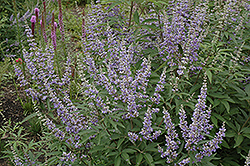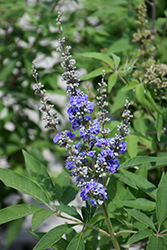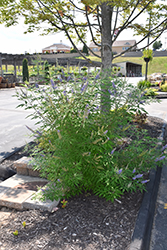It's all about ...
plants

Height: 15 feet
Spread: 10 feet
Sunlight:
![]()
![]()
Hardiness Zone: 6b
Description:
A relatively unusual shrub with airy spikes of lilac-purple flowers throughout the summer, distinctively palmate-leaves; can be treated like a perennial and cut back each spring, as it flowers on new wood and regrows vigorously
Ornamental Features
Chaste Tree has panicles of lightly-scented lilac purple flowers rising above the foliage from early summer to early fall. Its fragrant palmate leaves remain green in colour throughout the season.
Landscape Attributes
Chaste Tree is an open multi-stemmed perennial with an upright spreading habit of growth. Its relatively fine texture sets it apart from other garden plants with less refined foliage.
This plant will require occasional maintenance and upkeep, and is best cut back to the ground in late winter before active growth resumes. It has no significant negative characteristics.
Chaste Tree is recommended for the following landscape applications;
- Hedges/Screening
- General Garden Use
Planting & Growing
Chaste Tree will grow to be about 15 feet tall at maturity, with a spread of 10 feet. It tends to be leggy, with a typical clearance of 2 feet from the ground, and should be underplanted with lower-growing perennials. Although it is technically a woody plant, this fast-growing plant can be expected to behave as a perennial in our climate if planted outdoors over the winter, usually regrowing from its base (crown) the following year. As such, gardeners should take into consideration that it will perform differently than it would in its native habitat.
This plant does best in full sun to partial shade. It is very adaptable to both dry and moist locations, and should do just fine under typical garden conditions. It is considered to be drought-tolerant, and thus makes an ideal choice for a low-water garden or xeriscape application. It is not particular as to soil type or pH, and is able to handle environmental salt. It is highly tolerant of urban pollution and will even thrive in inner city environments, and will benefit from being planted in a relatively sheltered location. This species is not originally from North America.
This plant is not reliably hardy in our region, and certain restrictions may apply; contact the store for more information.


